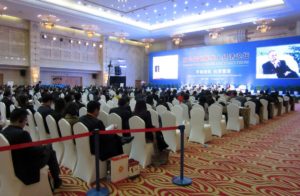 Thomas Friedman, the renowned author and newspaper columnist, recently wrote a column titled “The World Is Fast.” He did not say “Flat,” although he is the author of the bestselling book “The World Is Flat,” published in 2005, in which he argued that technological advances are creating a more level playing field for international commerce in the 21st Century. In “The World Is Flat,” Friedman demonstrated that the outsourcing of production and services and the development of supply chains, facilitated by the Internet, were making competitors more equal and geographical divisions less relevant.
Thomas Friedman, the renowned author and newspaper columnist, recently wrote a column titled “The World Is Fast.” He did not say “Flat,” although he is the author of the bestselling book “The World Is Flat,” published in 2005, in which he argued that technological advances are creating a more level playing field for international commerce in the 21st Century. In “The World Is Flat,” Friedman demonstrated that the outsourcing of production and services and the development of supply chains, facilitated by the Internet, were making competitors more equal and geographical divisions less relevant.
In his recent “The World Is Fast” column, Friedman notes that our globalized economies are more tightly tied together than ever before, that the powers of computers and software are rapidly replacing jobs and requiring new skills, and that the carbon and environmental degradation of our ecosystem is urgently demanding answers. He makes the point that the speed of change in our world requires fast response.
The need for fast response in today’s world is certainly true of logistics and supply chains in Asia. Investment—both public and private—in physical infrastructure to facilitate economic development is sorely lagging in many Asian countries. Moreover, attention to supply chain technologies and innovation is often misplaced or overlooked. Huge investments have been made in infrastructure for exporting activities but not in domestic distribution activities. Efficient management of domestic logistics and supply trains is given low priority. Ironically, as the economic wellbeing of the middle class in many Asian countries expands, domestic economic growth in these countries is beginning to outstrip export growth.
 Today the best opportunities for improvements in logistics and supply chains in Asia lie in creative management, technologies and innovation. Many of these opportunities do not involve the high cost and wait times of large infrastructure. Rather they involve corporate management’s attention to data analysis of customers’ likes and dislikes, study of transportation alternatives, and experimentation. New technologies can be employed more extensively—wireless scanners, barcodes, robotics, 3D printers, even drones. Governments can play a role by reducing bureaucratic impediments and motivating supply chain improvements. Business organizations can promote the sharing of logistics strategies and methodologies. Businesses can devote greater attention to improving communications, relationships, efficiencies and coordination among their supply chain links.
Today the best opportunities for improvements in logistics and supply chains in Asia lie in creative management, technologies and innovation. Many of these opportunities do not involve the high cost and wait times of large infrastructure. Rather they involve corporate management’s attention to data analysis of customers’ likes and dislikes, study of transportation alternatives, and experimentation. New technologies can be employed more extensively—wireless scanners, barcodes, robotics, 3D printers, even drones. Governments can play a role by reducing bureaucratic impediments and motivating supply chain improvements. Business organizations can promote the sharing of logistics strategies and methodologies. Businesses can devote greater attention to improving communications, relationships, efficiencies and coordination among their supply chain links.
Erik Brynjolfsson, the Schussel Family Professor of Management Science at the Sloan School of Management, Massachusetts Institute of Technology, points out that information technology today enables companies to gather extremely detailed information about their consumers, suppliers, alliance partners, and competitors. If companies utilize the resources of this “Big Data” to analyze the character and performance of each component of their supply chains, they can experiment with numerous alternatives to increase efficiency. To avoid disruption of a company’s existing supply chain configuration, it may be advisable to set up independent supply chain components within a company to test their efficacy. Experimentation in this way can be a key to positive change. In experimenting with alternative supply chain solutions, it is important to maintain an open mind, to avoid being “locked in” to established solutions, to be willing to accept the failure of an experiment, and to be willing to try again.
Third party logistics providers (“3PLs”) can also assist in developing improved supply chains. One such 3PL in the United States is Mochila Fulfillment (www.mochilafulfillment.com), a firm that provides customized and flexible warehousing and fulfillment services for its clients, especially e-commerce companies. Another is Tradesparq (www.tradesparq.com), a firm that helps international trade professionals identify and verify potential trade partners by using a combination of trade partner reviews, Tradesparq’s own network, and millions of records of waterborne shipments into the United States.
The challenges and opportunities for logistics and supply chains are huge in our fast world. Asia needs to speed up its responses. Globalization’s bus is moving and not slowing down. For those who do not want to be left in the dust, it is time to jump on board and grab the wheel.
© Copyright 2014 David James
